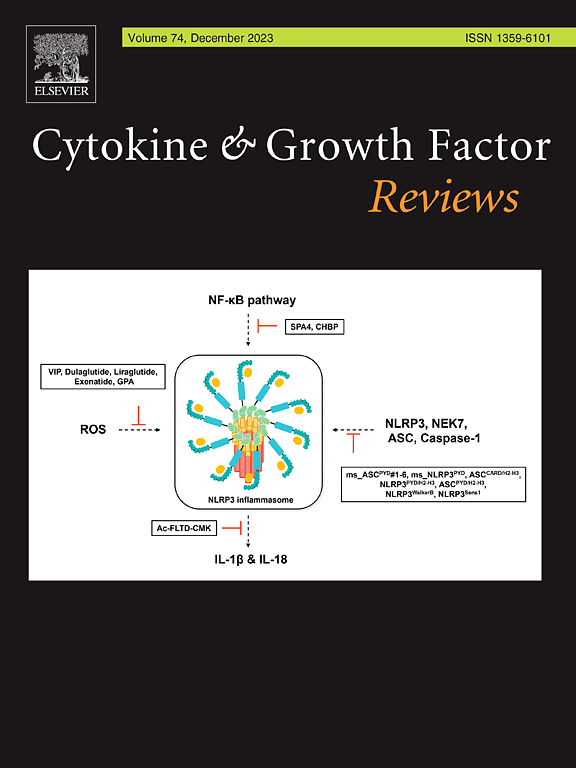用细胞因子设计免疫:可编程CAR疗法的逻辑框架
IF 11.8
2区 医学
Q1 BIOCHEMISTRY & MOLECULAR BIOLOGY
引用次数: 0
摘要
过继细胞免疫疗法已经改变了癌症治疗,嵌合抗原受体(CAR) T细胞在血液恶性肿瘤中实现了前所未有的缓解。然而,实体肿瘤翻译仍然受到抗原逃逸、不良微环境和危及生命的毒性的限制。细胞因子和趋化因子是这些障碍的核心,以需要工程解决方案的方式塑造贩运,持久性和毒性。这篇综述介绍了第一个统一的五层框架——识别、导航、安全、持久和翻译——通过细胞因子和趋化因子逻辑组织CAR工程。创新包括双靶点和逻辑门控car来对抗异质性,缺氧和趋化因子响应电路来增强浸润,诱导安全开关来减轻IL-6/ il -1β驱动的细胞因子风暴,以及IL-7/IL-15支持来延长持久性。除了T细胞,CAR逻辑现在也被移植到NK细胞和巨噬细胞中,通过先天细胞毒性和基质重塑来补充适应性记忆,而ipsc衍生的效应物则提供可扩展的、标准化的生产。总之,这些进展将细胞免疫疗法重新定义为一个细胞因子引导的、可编程的免疫生态系统,为治疗方案的设计提供了一个概念性路线图,不仅针对效力,还针对安全性、持久性和广泛的临床整合。本文章由计算机程序翻译,如有差异,请以英文原文为准。
Designing immunity with cytokines: A logic-based framework for programmable CAR therapies
Adoptive cellular immunotherapy has transformed cancer care, with chimeric antigen receptor (CAR) T cells achieving unprecedented remission in hematologic malignancies. Yet solid tumor translation remains limited by antigen escape, hostile microenvironments, and life-threatening toxicities. Cytokines and chemokines are central to these barriers, shaping trafficking, persistence, and toxicity in ways that demand engineered solutions. This review introduces the first unified five-layer framework—Recognition, Navigation, Safety, Persistence, and Translation—that organizes CAR engineering through cytokine and chemokine logic. Innovations include dual-target and logic-gated CARs to counter heterogeneity, hypoxia- and chemokine-responsive circuits to enhance infiltration, inducible safety switches to mitigate IL-6/IL-1β–driven cytokine storm, and IL-7/IL-15 support to extend persistence. Beyond T cells, CAR logic is now ported into NK cells and macrophages, complementing adaptive memory with innate cytotoxicity and stromal remodeling, while iPSC-derived effectors offer scalable, standardized production. Together, these advances reframe cellular immunotherapy as a cytokine-guided, programmable immune ecosystem, providing a conceptual roadmap for therapies engineered not only for potency but also for safety, durability, and broad clinical integration.
求助全文
通过发布文献求助,成功后即可免费获取论文全文。
去求助
来源期刊

Cytokine & Growth Factor Reviews
生物-生化与分子生物学
CiteScore
21.10
自引率
1.50%
发文量
61
审稿时长
22 days
期刊介绍:
Cytokine & Growth Factor Reviews is a leading publication that focuses on the dynamic fields of growth factor and cytokine research. Our journal offers a platform for authors to disseminate thought-provoking articles such as critical reviews, state-of-the-art reviews, letters to the editor, and meeting reviews.
We aim to cover important breakthroughs in these rapidly evolving areas, providing valuable insights into the multidisciplinary significance of cytokines and growth factors. Our journal spans various domains including signal transduction, cell growth and differentiation, embryonic development, immunology, tumorigenesis, and clinical medicine.
By publishing cutting-edge research and analysis, we aim to influence the way researchers and experts perceive and understand growth factors and cytokines. We encourage novel expressions of ideas and innovative approaches to organizing content, fostering a stimulating environment for knowledge exchange and scientific advancement.
 求助内容:
求助内容: 应助结果提醒方式:
应助结果提醒方式:


